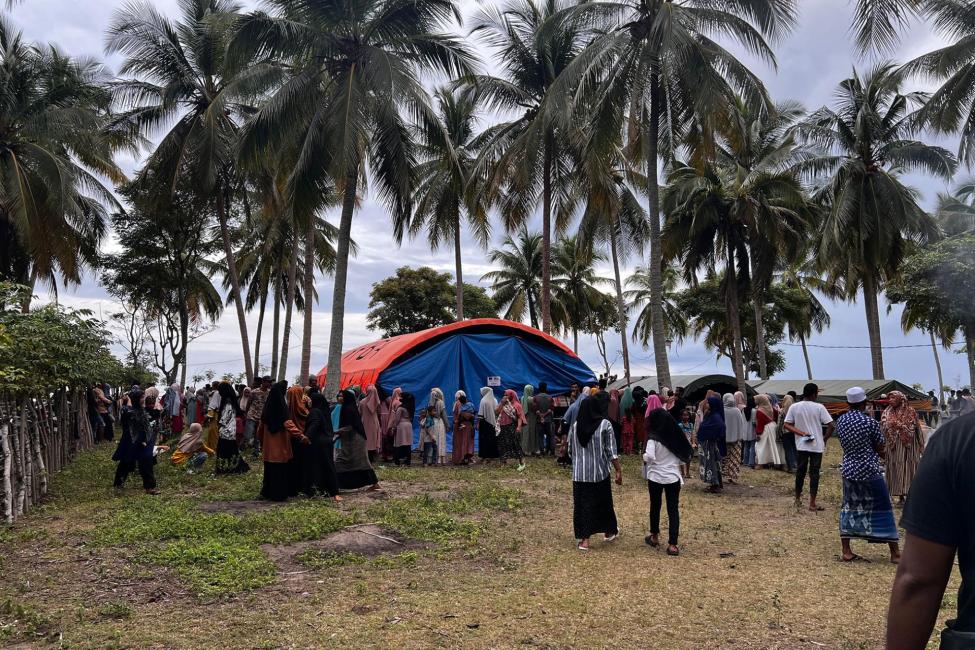-
Who we are
WHO WE AREThe International Organization for Migration (IOM) is part of the United Nations System as the leading inter-governmental organization promoting since 1951 humane and orderly migration for the benefit of all, with 175 member states and a presence in over 100 countries. IOM joined the United Nations system in September 2016.
About
About
IOM Global
IOM Global
-
Our Work
Our WorkAs the leading inter-governmental organization promoting humane and orderly migration, IOM plays a key role to support the achievement of the 2030 Agenda through different areas of intervention that connect both humanitarian assistance and sustainable development.
Cross-cutting (Global)
Cross-cutting (Global)
- Data and Resources
- Take Action
- 2030 Agenda
Climate Change Forces Humanitarian Community to Adapt IOM DG Tells ECOSOC HAS
Geneva - Climate change is forcing the humanitarian community to adapt and innovate its approaches to humanitarian assistance, International Organization for Migration (IOM) Director General António Vitorino told attendees at the United Nations Economic and Social Council Humanitarian Affairs Segment (ECOSCO HAS) today in Geneva.
“We will continue to support local and national authorities to use better data and prepare and strengthen response capacities to address and coordinate climate displacement based on international best practices, while ensuring inclusive and participatory processes adapted to the local contexts,” DG Vitorino said.
Held from 21 to 23 June, ECOSCO HAS brought together policy makers and practitioners from Member States, the United Nations system, development actors, the private sector and other humanitarian partners. ECOSOC HAS has been an essential platform for discussing the activities and issues related to strengthening the coordination and effectiveness of the humanitarian assistance of the United Nations since 1998.
IOM participates in the event annually, incorporating migration and displacement perspectives in contemporary humanitarian discourse.
This year, IOM co-organized two side-events. The first high-level side event on disasters and climate-related displacement was co-sponsored by the European Union (EU), Republic of Fiji, IOM, United Nations High Commissioner for Refugees (UNHCR), United Nations Office for the Coordination of Humanitarian Affairs (OCHA), and the International Federation of Red Cross and Red Crescent Societies (IFRC).
“We must continue to strengthen our forecasting capacities to better anticipate and understand the scope and nature of disaster displacement to inform decision-making, programme design, and advocacy efforts,” IOM Deputy Director General (Operations) Ugochi Daniels told attendees.
“To reduce acute needs, we must act early. In Somalia, for example, we knew the scale of displacement would be significant, but funding came late so the response was reactionary and could not effectively target affected areas.”
Co-organized by IOM, NEAR, Charter for Change, and Oxfam, the second side event featured a panel composed of representatives from IOM and three local non-governmental organizations from Northwest Syria, Uganda, and Lebanon.
The main outcomes of the event are the clearer linkages between localization and accountability to affected people for a more effective and sustainable humanitarian response that facilitates long-term solutions, and the needs of local partners for technical and organizational capacity building, in addition to funding, to strengthen their ability to respond quickly and effectively to humanitarian emergencies.
At the meeting on the transition from relief to development, which preceded the ECOSOC HAS, DDG Daniels stressed during a high-level panel discussion on resilience and sustainable solutions in crisis contexts, the critical importance of investing early in reducing disaster and conflict risks and the need to make better use of the existing resources in driving pathways towards resilience and sustainable solutions.
“The most valuable among these resources are the communities and their local leadership themselves,” she said.
For more information, please contact:
Angela Staiger, astaiger@iom.int
Amanuel Mehari Email, amehari@iom.int

